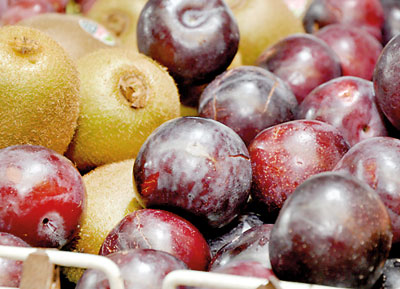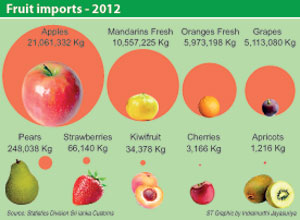News
Bitter truth of imported fruits
Storage under fluctuating temperatures for long periods promotes fungi growth on fruits which is the commonest form of contamination
Are all the luscious fruits imported into Sri Lanka including apples, grapes and oranges fit for human consumption? Health officials say a firm “NO.” According to them, some carry bacteria or other toxic chemicals and warn consumers to be careful. According to Sri Lanka Customs, last year, Sri Lanka imported 5.9 million kg of fresh oranges for Rs 511 million, and also consumed 5.1 million kg of fresh grapes costing Rs 1.1 billion, and 21 million kg of apples costing Rs 1.8 billion.

Among the other imported fresh fruits are strawberries, pears, quinces, kiwi fruit, plums and sloes. National Hospital’s Poison Centre has received several complaints from parents, that their children had suffered from symptoms of food poisoning after consuming oranges and grapes purchased from supermarkets, said its head Dr Varuna Gunatilake.
He said the children had suffered from vomiting, diarrhoea, abdominal pains and cramps. “The source of contamination was the fungus on the surface of the oranges. These children were from affluent families and the fruits purchased from supermarkets. It is necessary to check these fruits both at entry as well as at supermarkets and shops. There should be at least a ‘best before’ date,” Dr Gunatilake said. He said that authorities should check fruits that lie in supermarkets for months.
“Once the fruit is contaminated, the vitamins and antioxidant properties will not remain. This is a bad trend, as most foreigners in the country go for fruits they are familiar with,” he added. Health Ministry Food Control Administration Unit’s Consultant Dr. S. Nagaiah said fruits do not lose their nutritional qualities and are safe when additives such as edible wax are used to preserve their moisture.
“Sorbate and Sulphites are permitted preservatives for surface treated fruits. But the fungus outside can even spoil the fruit,” he said.
Storage rot is the commonest storage disease of citrus fruits. The fungal spores enter through small injuries, and, at first, form white, circular spots of fungal growth. This fungus is also transferred from fruit to fruit by contact.

Apples, kiwi fruit and plums: All that’s luscious, not fit for consumption. Pix by Indika Handuwala
Dr Nagiah said poor storage is one main reason for contaminated fruits. “Fruits are meant to be kept in cold storage below five degrees, but prolonged exposure to fluctuating temperatures can result in fungus. The electricity hike has also resulted in some supermarkets and fruit shops switching off their cold storages. Eighty percent of fruit importers are not following proper storage conditions,” he added.
He said when purchasing from supermarkets, most people check the price tag and the country it is imported from. “Unfortunately, in our country imported fruits are mainly consumed by children, the aged, patients and health conscious adults. The Ministry of Health should come up with guidelines with regard to storage temperatures and inspections,” he said. Colombo Municipal Council’s Chief Medical Officer Dr Pradeep Kariyawasam said that some storage facilities itself contain fungus-infested refrigerators.
“We do raids and destroy fruits that are spoilt or stored in poor conditions. Under the Food Act, the fine is less than Rs 5,000, which is a meagre amount for importers. It is best to destroy the consignment,” he said. He said containers should be thoroughly checked at the point of entry.
“There are only 12 food inspectors for the city of Colombo. We need more staff to ensure that all places, from street shops to supermarkets, sell fruits fit for consumption,” Dr Kariyawasam said.
The Agriculture Dept is responsible for checking fruit quality at the entry point. According to the Agriculture Dept’s Plant Quarantine Service Director, S.C. Wanigasuriya, all imported fruits that enter the country only by sea, should be with a phytosanitary certificate, which is a quarantine requirement.
A phytosanitary certificate is an official document issued by the plant protection organization of the exporting country to its counterpart of the importing country. It is to certify that the plants/plant products described above have been inspected according to appropriate procedures and are considered to be free from quarantine pests, and virtually free from other injurious pests.

“Permits are issued only when a phytosanitary certificate is submitted. We also conduct random sample tests. If there are contaminated fruits, the consignment will be destroyed. But this is only at the entry point. Once it has entered the country, health authorities should inspect,” he said.
He said that the department is in the process of preparing a circular to issue import permits only to importers who have properly maintained cold storages. “At present, anyone can bring down imported fruits. But once the circular is issued, proper cold storages will be a permit condition. The circular will come into force within a few months time,” he said.
Consumer Affairs Authority (CAA) Chairman Rumy Marzook said that the CAA is beginning to get complaints of contaminated imported fruits both in streets and supermarkets. “We are in the process of introducing ‘best before’ labels on imported fruits. People eat fruits to be healthy and not become sick; therefore, we see this as a serious concern,” he added.
Health Ministry’s Food Administration Control Unit’s Assistant Director Tilakaratne Haputantri said training is given to Food Inspectors by the Agriculture Dept on how to identify fungi and contaminated fruits.

“Last week, when I purchased grapes from a supermarket, I found fungi on the grapes. Supermarket authorities should ensure that these fruits are not kept for a long time. Bacterial poisoning is the commonest illness caused from consuming contaminated fruits,” said Health Ministry’s Nutrition Unit Director Dr Samaranayake.
He said that it is important to examine the fruit thoroughly before purchasing. “Some supermarkets tend to remove the spoilt or contaminated part out and sell the other part in sealed packets. It is not a healthy option,” Dr Samaranayake said. When contacted, leading supermarket chains refrained from commenting on the concern.
Negombo’s Chief Medical Officer Dr. N.K. Wijeyalath said people often forgot to inspect the outer surface of the fruit or whether it spoilt within when they bought imported fruit in supermarkets. “We have intensified our raids to check imported fruits,” he said.
Follow @timesonlinelk
comments powered by Disqus

